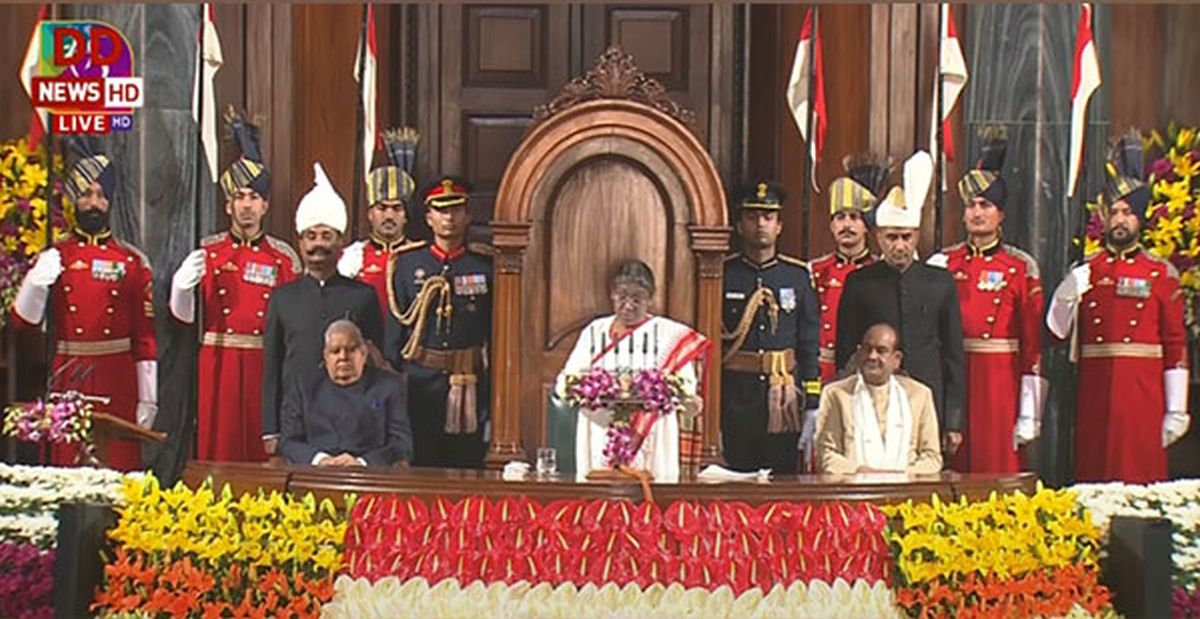From UPSC perspective, the following things are important :
Prelims level: President and governor speeches
Mains level: the tradition of presidential and gubernatorial addresses to Parliament and Legislative Assemblies in India

Central Idea:
The article discusses the tradition of presidential and gubernatorial addresses to Parliament and Legislative Assemblies in India, highlighting the ceremonial and ritualistic nature of these events. It emphasizes the need for reform to streamline these addresses, suggesting a shift towards shorter, more concise speeches akin to the British practice, to save time and enhance efficiency in legislative proceedings.
Key Highlights:
- Presidential and gubernatorial addresses in India are steeped in tradition, characterized by elaborate ceremonies and rituals.
- The speeches are drafted by the government of the day, with little involvement from the heads of state, leading to lengthy and sometimes tiresome readings.
- Past presidents like R. Venkataraman and K.R. Narayanan exhibited meticulousness in reviewing draft speeches, suggesting improvements that were generally accepted.
- Similar experiences were observed at the state level, with governors making suggestions for changes to their addresses, sometimes leading to unexpected challenges.
- The article reflects on instances of political civility, where suggested changes were acknowledged and accommodated, despite time constraints.
- Despite the ceremonial nature of these addresses, controversy and turbulence in legislative assemblies have been on the rise, fueled by accusations and counter-accusations.
- The root cause of the problem lies in the disconnect between the writers and readers of these speeches, raising questions about ownership and relevance.
- The author proposes adopting a more concise format for these addresses, similar to the British model, to refocus attention on legislative business and mitigate political polarization.
Key Challenges:
- Resistance from governments accustomed to using these addresses as platforms to showcase their achievements and plans.
- Convincing stakeholders about the efficacy of shifting towards shorter, more focused speeches.
- Overcoming entrenched traditions and resistance to change within the political system.
- Balancing the ceremonial aspects of these addresses with the need for efficiency and relevance in legislative proceedings.
- Addressing political polarization between central and state governments, which may hinder collaborative efforts towards reform.
Main terms for answer quality enhancement:
- Presidential address
- Gubernatorial address
- Ceremonial
- Ritualistic
- Legislative proceedings
- Political polarization
- Tradition
- Efficiency
- Reform
Important Phrases:
- “Land of largely unquestioned custom, ceremonials, and rituals”
- “Suggesting changes by them difficult”
- “Saving of time and the avoiding of tedium”
- “Political civility”
- “Root of the problem”
- “Ornament of convention”
- “Collective body of legislators”
- “Innovative and self-denying Chief Minister”
Quotes:
- “When I am asked to read these Addresses, I feel like saying ‘Rashtrapati Bhavan’ and sitting down!” – R. Venkataraman
- “The speech was not mine, it was yours.” – Unnamed speaker to Nitish Kumar
- “Who Owns that Speech?” – Professor A.R. Venkatachalapathy
Anecdotes:
- R. Venkataraman’s meticulous review of draft speeches, despite tight timeframes.
- Chief Minister Buddhadeb Bhattacharjee’s prompt action to rectify an oversight in a gubernatorial address.
- The Governor of Bihar officiating a seamless legislative ceremony, earning appreciation from the Chief Minister.
Useful Statements for critical approach in answer writing:
- “The root of the problem lies in the foundational dichotomy of one agency writing the speech and another reading it.”
- “Presidents and Governors will, I think, be relieved with such a rearrangement.”
- “It will take an innovative and self-denying Chief Minister to start the reform to rescue a custom, ceremony, and ritual of grace from disgrace.”
Examples and References:
- Instances of past presidents and governors suggesting changes to draft speeches, with varying degrees of acceptance and acknowledgment.
- Comparison with the British practice of brief, outline-focused speeches by the head of state.
Facts and Data:
- Terms of past presidents and governors mentioned in the article (e.g., R. Venkataraman, K.R. Narayanan).
- References to specific events, such as the oversight in printing a gubernatorial address.
Critical Analysis:
- The article presents a nuanced critique of the ceremonial nature of presidential and gubernatorial addresses, highlighting inefficiencies and challenges.
- It underscores the importance of streamlining these addresses to enhance legislative efficiency and mitigate political polarization.
- The proposed reform aligns with the need for modernization and adaptation within the Indian political system.
Way Forward:
- Advocate for collaborative efforts among stakeholders to initiate reform and streamline the process of presidential and gubernatorial addresses.
- Emphasize the benefits of shorter, more focused speeches in enhancing legislative efficiency and relevance.
- Encourage political leaders to prioritize the collective interests of legislators and citizens over traditional ceremonies and rituals.
Get an IAS/IPS ranker as your 1: 1 personal mentor for UPSC 2024
